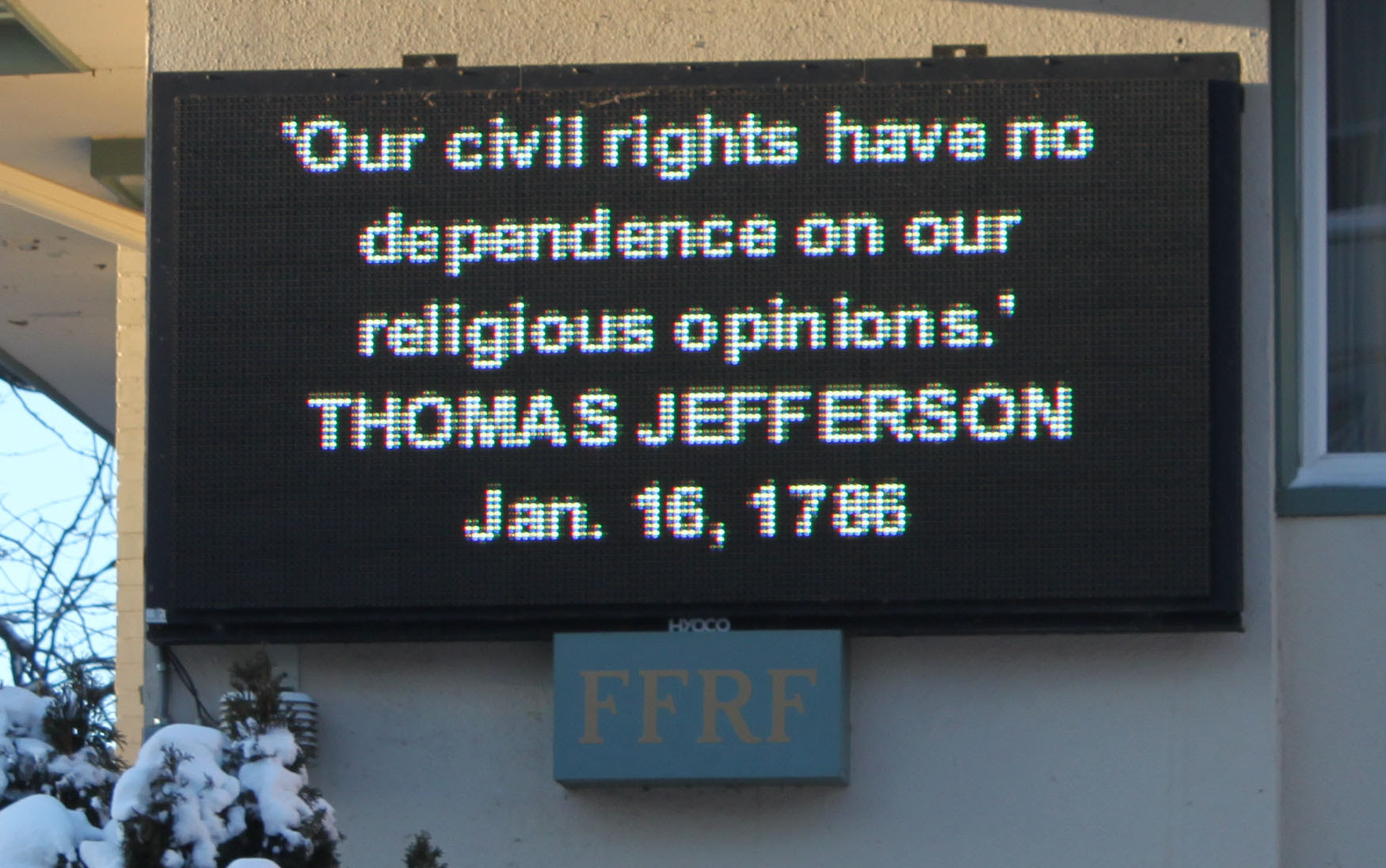The Freedom From Religion Foundation celebrates Religious Freedom Day every Jan. 16, even though we think every day should be Religious Freedom Day.
On this day 238 years ago, the Virginia Assembly passed the Virginia Statute for Religious Freedom, a law drafted by Thomas Jefferson and one of the three achievements he had inscribed on his gravestone. James Madison, later to become the primary architect of our godless Constitution and Bill of Rights, skillfully advocated for the law and shepherded it through the Legislature.
Since 1993, U.S. presidents have honored this historic legislation, which was a landmark statement on freedom of conscience and the principle of separation between state and church, and is a precursor of the First Amendment protections for religious freedom.
But we can’t help wondering what legislature today would pass these words from the statute:
“To compel a man to furnish contributions of money for the propagation of opinions which he disbelieves, is sinful and tyrannical.”
“Our civil rights have no dependence on our religious opinions, any more than on our opinions in physics or geometry.”
“Truth is great and will prevail if left to herself.”
What state legislatures today would pass these words, condemning “the impious presumption of legislators and rulers, civil as well as ecclesiastical, who … endeavoring to impose them on others, hath established and maintained false religions over the greatest part of the world and through all time”?
The historic statute concludes: No one “shall be compelled to frequent or support any religious worship, place, or ministry whatsoever, nor shall be enforced, restrained, molested, or burthened in his body or goods, nor shall otherwise suffer, on account of his religious opinions or belief.”
The statute ends by declaring that “all men shall be free to profess, and by argument to maintain, their opinions in matters of religion, and that the same shall in no wise diminish, enlarge, or affect their civil capacities.”
Fortunately, even if the core language prohibiting the states from forcing citizens to attend or support religious institutions and ministries would not make it past committee in most state legislatures today, that language, in fact, already exists, in some form or other, in some 39 state constitutions.
Dismayingly, this watershed language, which is stronger and clearer than the Establishment Clause of the First Amendment, is under systematic attack by the U.S. Supreme Court, which is gradually gutting this Jeffersonian principle. The high court in 2017, by a 7–2 vote, ruled in the Trinity Lutheran case that Missouri’s constitutional bar to direct or indirect taxpayer funding in aid of churches and ministries was dead. In the 2020 Espinoza v. Montana decision, the court ruled that Montana could not exclude religious schools from the state’s tax credit school voucher program, despite state constitutional prohibitions. The 2022 school voucher case, Carson v. Makin, out of Maine, forced similar funding, prompting Justice Sonia Sotomayor to lament in her dissent: “Today, the court leads us to a place where separation of church and state becomes a constitutional violation.”
The Statute for Religious Freedom is 238 years old, but how can its core tenets endure much longer with a high court that is this hostile to its basic precepts?
That’s why the Freedom From Religion Foundation, in continuing our fight for the fundamental principle of separation between religion and government, knows that this also necessitates fighting for court reform and expansion. It’s also why FFRF has created the FFRF Action Fund, a c(4) arm, to increase legislative work and flex some needed electoral muscle.
The Freedom From Religion Foundation is a national nonprofit organization with more than 40,000 members across the country. Our purposes are to protect the constitutional principle of separation between state and church, and to educate the public on matters relating to nontheism.
If you are an FFRF member, sign into your account here and then update your email subscriptions here.
To become an FFRF member, click here. To learn more about FFRF, request information here.


